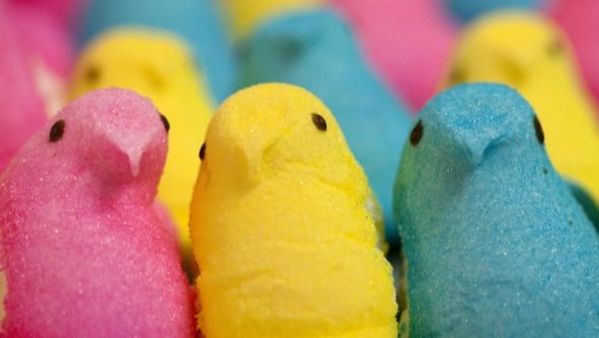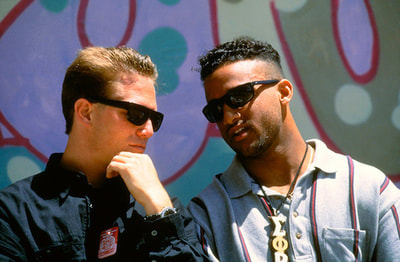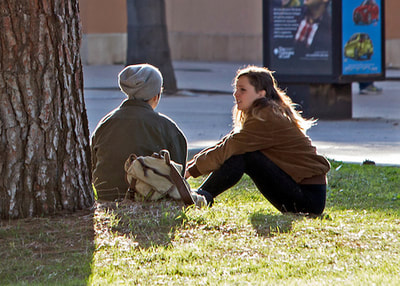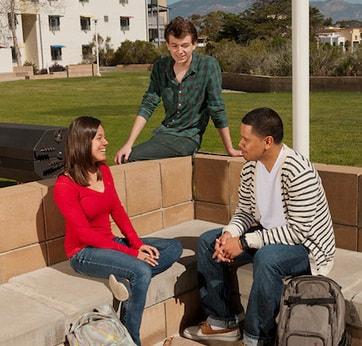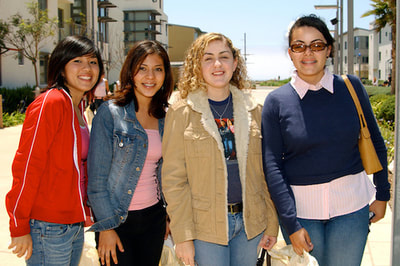Your friendships are an important part of your college experience. Friends accompany you on your adventures and they provide an important source of support when things get challenging. Whether you are new to UCSB and trying to make new friends, or you've been here, your friend groups have shifted, and they're no longer the right fit for you, finding a group of close friends is important for your health. Science says so!
Close friends can...
Forming and maintaining friendships sometimes comes with challenges. Check out this page to learn more about selecting your friend group, effectively communicating your needs, and deciding when to invest your energy in a friendship and when it might be time to get out.
Close friends can...
- Enhance your day to day experiences and bring vitality to your life
- Help you to feel safe, secure
- Contribute to your foundation of self-worth---the sense that you are significant, lovable, and worthy of care
- Pick up some of the load (they have your back!) when you need them
- Help you (e.g., soothing, problem solving) when you aren't able to handle things alone
Forming and maintaining friendships sometimes comes with challenges. Check out this page to learn more about selecting your friend group, effectively communicating your needs, and deciding when to invest your energy in a friendship and when it might be time to get out.
Finding Your People
Why is it sometimes hard to get connected? Getting connected as an adult requires a coordinated effort! When you were younger, many of the social situations where you met your friends were constructed for you (e.g., playdates, homeroom). Now you have to seek out situations to meet others (e.g., joining an org) and you have to make efforts to reach out to others in environments that can feel intimidating and impersonal (e.g., class in a big lecture hall). Here are some ways to create opportunities to meet your peeps.
- Get to know the people who live with you and around you. Proximity is one way to get connected. Take time to get to know your roommates and neighbors. You might find that some really cool people are right beside you. But don't also fret if you don't find your closest friends in the place that you live. Many students find their friend groups through the other activities and interests that they have.
- Join groups/activities based on your interests. You will feel most comfortable and most yourself when you are doing the things that you love to do. Political junkie? Film buff? Soccer fanatic? Finding others who share your common interests creates a natural point of connection to start and then you can build from there.
- Join groups/organizations that support an important part of your identity. Students find that they sometimes feel most at home and understood when they develop relationships with others who share their common values, spiritual beliefs, or cultural experiences. Check out the various campus cultural and resource centers, clubs and organizations, and the IV community to find your place.
Friendship Rules to Live By
1. Make friends consciously. Don’t passively drift into a group whose values you’re not sure about.
2. Recognize that conflict is part of friendship. Don’t let resentments build up — bring them up gently to avoid blowouts down the line.
3. Don’t treat them as you’d like to be treated. Treat them as THEY would like to be treated. We don’t all feel comforted or appreciated by the same behaviors.
4. Give little (encouraging text messages) and give big (birthday dinner).
5. Be supportive 90 percent of the time, but don’t shy away from telling your friend a difficult truth once in a while.
6. Listen to the difficult truths about yourself when a friend points them out. Don’t get defensive--this is your chance to really learn about yourself.
7. Accept that you will sometimes envy your friends, be annoyed by them, be bored by them. What a small price to pay for all their benefits.
8. Improve yourself, and you will be improving your friends, too. Friends are a big influence on your health, habits and aspirations — and vice-versa.
9. Social media should only enhance your connections. It shouldn’t cut into time with close friends.
10. Celebrate your Friendiversary. Mark your time together by recognizing your friend and your friendship!
~Adapted from Carlin Flora: www.twitter.com/carlinf
2. Recognize that conflict is part of friendship. Don’t let resentments build up — bring them up gently to avoid blowouts down the line.
3. Don’t treat them as you’d like to be treated. Treat them as THEY would like to be treated. We don’t all feel comforted or appreciated by the same behaviors.
4. Give little (encouraging text messages) and give big (birthday dinner).
5. Be supportive 90 percent of the time, but don’t shy away from telling your friend a difficult truth once in a while.
6. Listen to the difficult truths about yourself when a friend points them out. Don’t get defensive--this is your chance to really learn about yourself.
7. Accept that you will sometimes envy your friends, be annoyed by them, be bored by them. What a small price to pay for all their benefits.
8. Improve yourself, and you will be improving your friends, too. Friends are a big influence on your health, habits and aspirations — and vice-versa.
9. Social media should only enhance your connections. It shouldn’t cut into time with close friends.
10. Celebrate your Friendiversary. Mark your time together by recognizing your friend and your friendship!
~Adapted from Carlin Flora: www.twitter.com/carlinf
Even the closest friends can have difficulties communicating with one another, they can argue and hurt one another, and/or grow distant.
When you feel upset with or hurt by a friend it can sometimes be difficult to resolve those feelings and mend your relationship. And if you're like many people, you might not feel like you have all the tools to make talking it out go smoothly.
Check out our strategies for navigating these conversations with greater ease!
When you feel upset with or hurt by a friend it can sometimes be difficult to resolve those feelings and mend your relationship. And if you're like many people, you might not feel like you have all the tools to make talking it out go smoothly.
Check out our strategies for navigating these conversations with greater ease!
Proudly powered by Weebly

